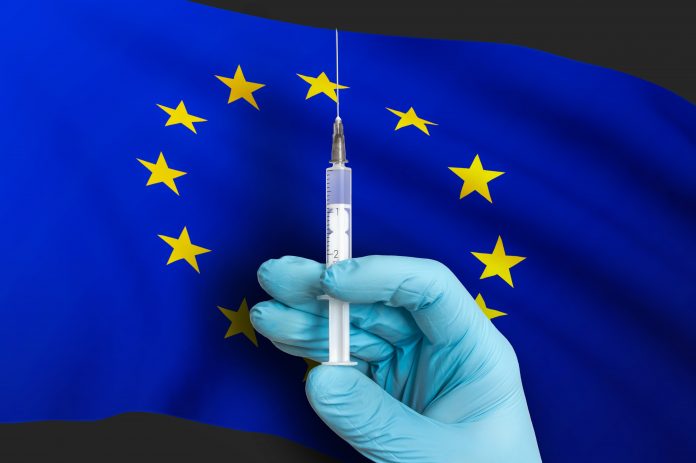EU leaders today (25 March) decided not to create an export ban for AstraZeneca vaccines made for the UK – but the feud between AstraZeneca and the bloc remains close to the surface of future discussions
After the UK-EU vaccine feud escalated last week, today (22 March) there are new reports that the EU will stop exports of the AstraZeneca vaccine to the UK.
As reported in Politico, senior officials in the EU briefed Reuters and Bloomberg about plans to reject any AstraZeneca vaccine export requests from the UK. The UK expects to receive a shipment of Moderna in April, but is depending on Pfizer and AstraZeneca shipments from EU manufacturers.
A vaccine delay is expected in the UK from 29 March, due to problems with the international supply chain via India.
But today (25 March) EU leaders have decided not to enforce a direct export ban.
In a joint statement between the EU and UK, leaders said: “Given our interdependencies, we are working on specific steps we can take — in the short-, medium- and long term — to create a win-win situation and expand vaccine supply for all our citizens.
“In the end, openness and global cooperation of all countries will be key to finally overcome this pandemic and ensure better preparation for meeting future challenges.”
‘That doesn’t work’, says EU official
The EU official told Reuters: “The Brits are insisting that the Halix plant in the Netherlands must deliver the drug substance produced there to them. That doesn’t work. What is produced in Halix has to go to the EU.”
According to the initial contract signed on 28 August, 2020, the EU would have the option to buy 300 million doses of the AstraZeneca vaccine – with the option to buy a further 100 million. However, the EU are receiving 60% less of their initial delivery than expected – beginning the feud that continues to this moment.
On 17 March, European Commission President von der Leyen highlighted that the export and import of vaccines was an “open road”, which could be closed at any time.
She further commented that the Commission “will reflect on whether exports to countries who have higher vaccination rates than us are still proportionate.”
Based on current efforts, the UK is expected to reach population vaccination long before the EU. The EU is pointing out this disparity as a reason for withholding vaccines.
Vaccine access is low in the global south, as intellectual property laws limit certain countries from being given the blueprints for making vaccines.
One of the key arguments for vaccinating poorer countries is to prevent COVID mutations from evolving, which would require a redesign of vaccines. Similarly in the EU, the South African and Brazilian mutation are key challenges faced by a largely unvaccinated public – who then risk hospitalisation and death.
Currently, the UK is creating real-world data by vaccinating the population with AstraZeneca. The data reveals that the AstraZeneca vaccine was 60% effective at preventing COVID in people who were atleast 70 years old, while Pfizer was 61% effective in the same age group.
There have been 30 reports of blood clots across five million people in Europe, but the feud has shaken public belief in the safety of vaccination.
UK officials said that any delays would not derail the re-opening of the country, as vaccinating over-50s would enable a return to society. However, the overall rollout for all adults may be slowed if there are significant vaccine shortages due to diplomatic issues.





![Europe’s housing crisis: A fundamental social right under pressure Run-down appartment building in southeast Europe set before a moody evening sky. High dynamic range photo. Please see my related collections... [url=search/lightbox/7431206][img]http://i161.photobucket.com/albums/t218/dave9296/Lightbox_Vetta.jpg[/img][/url]](https://www.openaccessgovernment.org/wp-content/uploads/2025/04/iStock-108309610-218x150.jpg)





